OP Sequence
 |
 |
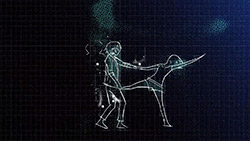 |
 |
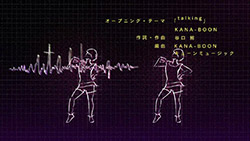 |
 |
OP: 「talking」 by KANA-BOON
 |
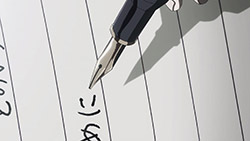 |
 |
 |
 |
 |
 |
 |
 |
 |
 |
 |
 |
 |
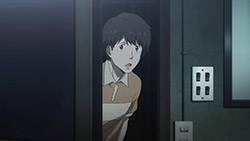 |
 |
 |
 |
 |
 |
 |
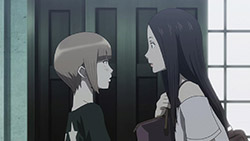 |
 |
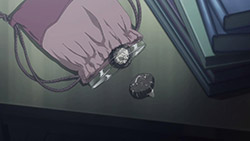 |
 |
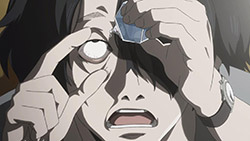 |
 |
 |
 |
 |
 |
 |
 |
 |
 |
 |
「白い面会」 (Shiroi Menkai)
“White Meeting”
Meh, exposition is overrated anyway.
This anime would be my first experience with Mori Hiroshi’s acclaimed mystery novel Subete ga F ni Naru: The Perfect Insider; I picked up coverage for it based on its credentials, its staff, and an interest in its premise. So I stepped into this pilot knowing very little about it, and came out of it knowing only a bit more. I imagine that those who did even less background reading than I—those just casually browsing TV channels, for example, or those checking out new shows on a whim—would have emerged from the first episode of Subete ga F ni Naru positively baffled. There was no real attempt to explain the setting, the time(s), or even the characters, who pop in at random intervals with neither pomp nor circumstance. Who are they? What do they do? Subete ga F ni Naru very deliberate dodges those questions. Such would be the trend of the entire episode. It starts with a framing device (that never makes clear exactly what it’s framing) and ends with… well, it just ends. Both the OP and the ED are largely metaphors that we’re probably not expected to understand yet (and there’s really nothing like the dancing OP to disguise what your show is about). We are, essentially, starting in media res, in the middle of the action, though action in this case is mostly dialogue and the daily life of a nerd in a room. But hey, look, a gaudy red sports car! That thing sticks out in so many ways.
We are provided with plenty of information, though, just not much context to go with it. Nishinosono Moe (Tanezaki Atsumi) is the daughter of a wealthy family (butler!) who’s bad with hot drinks. Saikawa Souhei (Kase Yasuyuki) is part of some research lab at some university who both smokes and philosophises far too much. We are shown a fair deal, and it’s difficult to process it all at the moment. For example, why is it important to know that Souhei is bad with eyedrops? Why the conspicously cracked coffee pot? Why mushrooms? It could be not all, or even any, of these details will end up relevant (or are perhaps deliberate red herrings), but it is the way of mystery stories to invite speculation about miniscue. Actually, if Subete ga F ni Naru was not billed as a mystery to begin with, I would have been hard pressed to definitively say it was one at this point. This pilot spends much of its time establishing characters, and the thrust of the plot will have to be revealed later. We only know that this Dr Magata Shiki (Kido Ibuki), the subject of imagery and flashbacks, will likely be integral to it. Genius programmer, self-styled recluse, parricide—if there’s a mystery in Subete ga F ni Naru so far, it’s her.
Looking ahead i.e. I have no idea
That certainly was an interesting way to start. I don’t know how Mori Hiroshi wrote the original Subete ga F ni Naru, but would it have been like this? No narration, no inner monologue, only dialogue, though helped by the fact that Moe says plainly what she thinks, or is otherwise very easy to read. And there’s certainly a lot buried in the dialogue, heavy with philosophy (they don’t waste time getting to the big questions about self and identity), technical details (‘Dr Magata is really smart and here is exactly why’) and titbits about character (why the maths quiz for Moe during the video-conference? Probably 1. to be cryptic 2. to reinforce that she’s quite intelligent). Positively, even with the dialogue focus the visuals look pretty good (if but a bit drab, but that’s likely a deliberate palette choice), with sufficiently detailed art and crisp animation when needed. I’m guessing this would have been what Owarimonogatari would have been like if they had played it straight.
I’m reluctant to guess at how Subete ga F ni Naru will proceed with its plot for now, because it has put a fair amount of work in building an enigma around itself, which is the main draw so far. The issue of Dr Magata killing her parents will certainly crop up again; she was not guilty by reason of mental impairment or something, but there’s many ways to plead that (by the talk of a ‘doll’, I’d hazard a guess for automation). And since the title (Everything Becomes F) seems to be a reference to the F key on your beyboard’s home row, and since there are also to the references to programming in both the story and the ED, computing will probably be a major motif. Otherwise, without knowledge of the original text, I can only speculate.
I have high hopes; the key thing to note, above all I’ve said, is that this pilot has been overall interesting, enough to hook even with a rather obscured bait (more a breadcrumb trail thus far). That’s a worthy start. And Bach’s Cello Suite No. 1 also reminded me of Hyouka, which is definitely a good vibe. There really aren’t enough good mysteries in anime, and a dedicated, long-game one like Subete ga F ni Naru is bound to be a treat. I think the staff know what they’re doing. I’m looking foward to seeing this mystery pan out then come together.
ED Sequence
 |
 |
 |
 |
 |
 |
ED: 「ナナヒツジ」 (Nana Hatsuji) by シナリオアート (Scenarioart)

Curious enough to stay with it. I enjoy these more “high-level” anime that require you to think. Trying to piece everything together should be fun.
The apparent lack of any concrete point to this episode makes me suspect I’ll drop it after next week and then marathon it when it’s over. I like thinking, but I also like having something to think about.
They may not be concrete, but the episode gave many questions that any viewer can play around with answering. The cross-cutting between the interview with Dr Magata and the ‘nerd life’ of the rest of our cast provokes conversation between the two – how is her philosophy different or similar to Saikawa’s, and what could this mean regarding how their relationship as characters might develop? The clumsiness of both Nishinosono and Saikawa, one with hot drinks and the other with eyedrops, also draws attention to a shared aspect of their character – how have they become closer, in terms of the internal factors that define who they are and their compatibility? Why is Magata secluded in so many ways, and how will our characters invading her isolation affect her, and them?
If you need a ‘concrete plot’ to watch a mystery show, you shouldn’t be watching mystery shows. The best stories of intrigue open up multiple avenues of thought without relegating the expansive discussion to an individual, linear issue at hand – working around, rather than towards, something critical. Subete ga F ni Naru has a central character – Magata – around which multitude of questions and ideas revolve, with satellites of intrigue made of the other characters revolving around her. The windows of opportunity into her personality, and how those resonate with the windows we’re given for our less isolated cast, were incredibly numerous for just twenty-ish minutes.
It’s poor practice to desire a single line of thought in a plot that operates like a solar system. Maybe you should go after getting something to ‘think about’ instead of expecting it to be handed to you. Mysteries reward active minds, not passengers.
I’ve honestly never even heard of a mystery like what you just so loftily described. All the ones I’ve read have been either murder/crime mysteries or puzzles, though. That must be the difference.
When I heard this was going to be similar to Hyouka I gave it a shot, but the lack of focus and introduction threw me. I like introductions; they let me care. That’s why I said I’d give it another episode and then probably marathon it at the end, and no, I don’t mean that I’d start at the end. I am bad at waiting for the next chapter of a mystery, though, and right now the characters here just don’t have the same pull as Eru and Houtarou.
Any series that references UNIX and Conway’s Game of Life is already a win for me.
Most intriguing premise for me thus far.
Lots of little bits. The ones I caught were the Linux kernel boot message, Debian’s copyright policy/disclaimer, Motif window manager, Lisp. Probably a few more. Sadly, the actual plot was pseudo intellectual at best. Didn’t really do all that much for me. Felt like the author was pandering to his reflection most of the time. I do like the Hannibal vibe oozing from the Magata chick though.
Yeah, just finished studying tenets of Linux so it was fun to see the kernel boot message. 😀 Also saw maybe an Intel chip, before it became what looked like a QR code?
I think give it 2 more episodes. I’m treating this episode as the “cold setup”.
I’ve little to no background on the intricacies of computers or their history, but I do have to point out those elements that could be construed as ‘pseudo-intellectual’. Now, while I may not describe the ideas that are running their course as necessarily ‘pseudo-intellectual’, they did however come across as questions people who don’t really know what to think about anything would ask. I intuitively know such a ‘concept’ so to speak, but I can’t precisely put it in words. It’s kinda like, they don’t really seem to know what they’re talking about, or why they want to think of such things within those terms, get what I mean?
In what is most probably simpler terms, they seem to go about everything in a run-about manner in regards to their selves.
If one dude says that they’re existentially empty or confused, then I guess it’s precisely that.
Man these characters’ questions about existence are making me confused as to why they’re so confused… This is crazy!
WARNING: Excessively self-indulgent rant incoming. Proceed at your own discretion. You have been warned.
Oh good, I was beginning to worry that the requisite seasonal anime that makes you want to bash your head against a wall had been forgotten.
Don’t get me wrong, Subete ga F ni Naru is a virtual cacophony of intrigue and uncertainty in a world that, if nothing else, is anything but shy about telling you what it thinks of itself. And for a mystery, that ain’t a bad place to be at all.
However, and let’s be perfectly frank here, there is precisely one – hand to my heart, I give you my digitally processed word – thing that just about killed this anime for me in one go, and that was the characters.
There’s really no being gentle about this. They’re all dead inside.
https://randomc.net/image/Subete%20ga%20F%20ni%20Naru/Subete%20ga%20F%20ni%20Naru%20-%2001%20-%2034.jpg
Take our resident genius (ironically, Rakudai Kishi just got through explaining why you shouldn’t box someone in with the label of a “genius”) with the absolutely perfect name of Shiki, a young-ish woman who may or may not have killed her parents when she was just a child.
It’s characters like this that irk me perhaps more so than most any other. They have so much potential, and yet they’ve been relegated, for various reasons, to having to think so damn hard just to keep themselves afloat that their very existence has been diminished to being like a ripple in a pool of water; transient and likely to fade away at any given moment.
Frankly put, they’re weak. That is precisely why Shiki is consumed with very philosophical sounding questions like “who am I” and “where am I going” that may sound high-level at first, but which are childishly easy to answer.
https://randomc.net/image/Subete%20ga%20F%20ni%20Naru/Subete%20ga%20F%20ni%20Naru%20-%2001%20-%2030.jpg
And, of course, we can’t forget this guy, the coup de grace whose very existence practically spews adjectives from my thought processes, Souhei-sensei, who is, to be put it kindly, a weak, manipulative, cowardly, abusive son of a b**** whom I very much want to die right now.
Really, there was nothing to like about this guy at all. Why anyone would fall for him is, truly, beyond me. Well maybe not, but I still don’t care to understand it in any case.
-Sigh-
Needless to say, for an opening episode, while Subete obviously has potential and could still turn things around, its entire premiere displayed the very bad habit of trying to come across as much more profound than it really is. Even a supremely satisfying mystery may not be enough to overcome all that, but it at least deserves the requisite three episodes to give it a fair shot. We shall see.
Regarding what many people mentioned about characters spewing “empty lines to sound philosophical”, I’m kind of sad that I have to pin this on the fact that the script had to be largely reduced when adapting the novel to anime.
I’m not going to go into any detail – since the anime might pick up some content later – but most of the “who am I”, “who are you” lines, even the “7 is the loneliest number” segment, go on for much longer. The scene between Moe and Shiki alone could have probably filled more than half of episode 1.
But even though, Subete ga F ni naru is a wonderful adaptation so far. It goes along the lines of what Madhouse did with Mouryou no Hako back in the days. They are throwing in all the important parts, but cut the additional information down so that really interested viewers could always read up on them (too bad there is almost no chance of the S&M series ever getting a proper translation).
Hmm, that’s interesting. ‘Cuz what we’ve soon far up to this point only seems to give the impression that the characters don’t seem to really know why they think of those things in such terms, or why they’re asking those questions in the first place. Regardless, I must reiterate that I am still personally intrigued and interested in knowing more about the circumstances surrounding the plot as it progresses.
There’s no way the complaints you have about the characters ‘kill the anime in one go’; the responsibility, judging by your reaction to the show, rests with you. If you don’t want to watch characters who are indeed ‘dead inside’, then that’s your issue of personal preference (and please never read Beckett), and it’s likely the reason why you can’t see the life of this show in contrast to the deadness of a large proportion of its cast.
You’re criticising a feature of design as a mistake; emptiness in a character is as valid a trait as any other, especially as it promotes added significance to anything that can be found later on beyond the surface-level impression. With that in mind, the two philosophers have sold their empty-philosopher personalities so well that you’ve been unable to get it out of your head. They are indeed sounding ‘more profound than they really are’ – but we can’t yet say whether they’re trying to sound profound or if the impression is a natural consequence of a lack of familiarity with them; either they are internally flawed in having shallow minds that feign all their insight or they are externally flawed in being unable to express their genius in a way that doesn’t come a cross as shallow to those around them, new or old. We’ve only given a twenty minute snapshot of their lives, after all. Inside Magata’s head there’s clearly a wealth of experience that’s contributing to her thoughts and feelings being genuine expressions of belief (whether we can say the same about Saikawa is an interesting opportunity for parallel or juxtaposition); but isolate these philosophers’ words – moreover, have characters introduce themselves with them – and you can’t help but be pushed back by not being on the same page and feeling like you never will be. Shallowness is often the first impression of a deep character; it’s what makes it all the more fun when the story suddenly takes you on a tour of their depth.
Of course, shallowness needs enquiry to not leave the character by the wayside, and this episode provided just that through the flip-side of the coin that’s you’ve selectively left out from your criticism. Clashing with these characters who are supposed to start by appearing like inaccessible ‘geniuses’ are people with a different approach, epitomized by Nishinosono. She asks the questions rather than attempt to answer them as the others do, and judging from the video exchange we saw and the interplay of that broken scene with the rest of the episode, we can look forward to her challenging both of our ’empty’ philosophers. She also forges the interplay between her, like yourself, judging Saikawa for his ’empty’ philosophy, but also loving him, and the fact you don’t care about their relationship speaks volumes for the fact that you’re selectively not caring about her lest you lose the armchair for all this criticism. She also brought out another thing you miss, which was that the most significant moment of her conversation with Magata was when Magata didn’t say anything. All the things she does say just contribute to gaps and mysteries, but her silence seems to lead us towards something, and that’s where our cast is destined to go. And yet, you focus on what she says. You’re avoiding the obvious impetus for the plot at the ending hook, which redefines all prior ’empty’ words.
You say they’re ‘all dead inside’, but give no explanation for Nishinosono, obviously because she undoes the argument. With the narrative bent around her, she’s breathing life into these ‘dead’ philosophising escapists.
On another note, those ‘deceptive’ questions are actually accepted as the most integral struggles of human existence; a simple mind thinks they have simple answers, but the more you think about them, you more you have to play around with parameters. If I am JekoJeko, for instance, but another person came on here and posted comments like this one under this name with this icon, what does it mean to be JekoJeko?
It’s called existentialism, and you probably need to Google it.
To summarise: you seem to be taking the classic and erroneous approach of having prerequisite ideas about value and merit in characters, judging them as individuals in relation to you and your perspective and not as characters in relation to each other; art is full of (and is only) relationships, but you cancel out every significant one in order to have this ‘excessively self-indulgent rant’ limited to only the relationship between each character and your own judgemental self. Magata and Saikawa might be unbearable if you were stuck in a lift with them, but it’s their exchanges with our protagonist that make ideological tension and drama flourish out of what would otherwise be emptiness.
Not only that, but your role as the receiving end sounds incredibly shallow if you think the struggles of existentialism are childish; that’s just disrespectful to people who have had identity crises, mental breakdowns and all manner of issues with life when those ‘childish’ questions grow a pair.
Ironically, the emptiest words concerning this show are coming from you.
In all seriousness, I absolutely love responses like yours. This is going to be so much fun. XD
Just for the sake of clarity, I’ll be responding to each segment of your response, piece by piece, in descending order.
>] “There’s no way the complaints you have about the characters ‘kill the anime in one go’; the responsibility, judging by your reaction to the show, rests with you. If you don’t want to watch characters who are indeed ‘dead inside’, then that’s your issue of personal preference (and please never read Beckett), and it’s likely the reason why you can’t see the life of this show in contrast to the deadness of a large proportion of its cast.”
First of all, I was talking about the anime with respect to my own personal impression of it, as I said in my original comment: “However, and let’s be perfectly frank here, there is precisely one – hand to my heart, I give you my digitally processed word – thing that just about killed this anime for me in one go, and that was the characters.”
Nowhere did I imply that I was speaking for anyone besides myself, so let’s make that perfectly clear.
>] “You’re criticizing a feature of design as a mistake; emptiness in a character is as valid a trait as any other, especially as it promotes added significance to anything that can be found later on beyond the surface-level impression. With that in mind, the two philosophers have sold their empty-philosopher personalities so well that you’ve been unable to get it out of your head. They are indeed sounding ‘more profound than they really are’ – but we can’t yet say whether they’re trying to sound profound or if the impression is a natural consequence of a lack of familiarity with them; either they are internally flawed in having shallow minds that feign all their insight or they are externally flawed in being unable to express their genius in a way that doesn’t come across as shallow to those around them, new or old. We’ve only given a twenty minute snapshot of their lives, after all. Inside Magata’s head there’s clearly a wealth of experience that’s contributing to her thoughts and feelings being genuine expressions of belief (whether we can say the same about Saikawa is an interesting opportunity for parallel or juxtaposition); but isolate these philosophers’ words – moreover, have characters introduce themselves with them – and you can’t help but be pushed back by not being on the same page and feeling like you never will be. Shallowness is often the first impression of a deep character; it’s what makes it all the more fun when the story suddenly takes you on a tour of their depth.”
Let me be perfectly clear in that I’m not against emptiness in a character. I actually agree with you wholeheartedly in that it can serve as the foundation for truly splendid character development later on. I’ve seen it many times before and that’s precisely the reason why I didn’t just drop Subete on the first episode and made it a point of saying that I would stick around, at least for a few more episodes, to see what would happen.
However, I said that these characters damn near killed this anime for me in this first episode and I stand by that statement. Why? Because even an empty character can be endearing and loveable, to make you want to root for them to overcome all the difficulties that made them that way and to rise up stronger than ever. A good comeback is one of my absolute favorite things to see in storytelling.
Subete did an absolutely fantastic job at conveying the deeply troubled and broken elements of its characters (a bit too much in some respects, to be sure, but that’s a minor slip), but it resolutely failed in making me want to care about them. First impressions count. Last season’s Gakkou Gurashi! is a fine example of how to do it right, but Subete’s first episode left the job half done.
>] “Of course, shallowness needs enquiry to not leave the character by the wayside, and this episode provided just that through the flip-side of the coin that’s you’ve selectively left out from your criticism. Clashing with these characters who are supposed to start by appearing like inaccessible ‘geniuses’ are people with a different approach, epitomized by Nishinosono. She asks the questions rather than attempt to answer them as the others do, and judging from the video exchange we saw and the interplay of that broken scene with the rest of the episode, we can look forward to her challenging both of our ‘empty’ philosophers. She also forges the interplay between her, like yourself, judging Saikawa for his ‘empty’ philosophy, but also loving him, and the fact you don’t care about their relationship speaks volumes for the fact that you’re selectively not caring about her lest you lose the armchair for all this criticism. She also brought out another thing you miss, which was that the most significant moment of her conversation with Magata was when Magata didn’t say anything. All the things she does say just contribute to gaps and mysteries, but her silence seems to lead us towards something, and that’s where our cast is destined to go. And yet, you focus on what she says. You’re avoiding the obvious impetus for the plot at the ending hook, which redefines all prior ‘empty’ words.”
You’re absolutely right when you say that shallowness needs inquiry, but the inquiry only merits as much worth as what it shows us, the audience. Yes, Nishinosono asked quite a few questions – many of them interesting, admittedly – and engaged the other characters, but what did we get out of that? Not too much. In fact, the only memorable moment, which Nishinosono herself actually describes it as, was when she asked Shiki who she was, to which Shiki gave an oddly cryptic smile and no real answer in response.
Will that scene play a larger role in future episodes? Yes, I would imagine so, but the problem is is that Nishinosono was dancing like a puppet on strings in Shiki’s hands the whole while. You can’t call it an inquiry, at least not a worthwhile one, if you’re not in a position to hold your own. You’ll never get anything out of the other person that they didn’t want you to know to begin with, making the whole point moot and little more than fluff.
>] “You say they’re ‘all dead inside’, but give no explanation for Nishinosono, obviously because she undoes the argument. With the narrative bent around her, she’s breathing life into these ‘dead’ philosophising escapists.”
Actually, to tell you the truth, I didn’t include Nishinosono in my original comment ‘cause I was typing out that whole thing right before I had to get ready for work and I didn’t have enough time. Sorry ‘bout that. XD
>] “On another note, those ‘deceptive’ questions are actually accepted as the most integral struggles of human existence; a simple mind thinks they have simple answers, but the more you think about them, you more you have to play around with parameters. If I am JekoJeko, for instance, but another person came on here and posted comments like this one under this name with this icon, what does it mean to be JekoJeko?”
You’re certainly free to imply that I have a simple mind just because I think those questions have simple answers, but I’ll respond in kind by saying that a mind that makes proverbial mountains out of molehills by elevating those questions to some kind of philosophical plateau is carrying around a whole lot of dead weight and making otherwise easy questions a lot more difficult than they need to be.
As for your JekoJeko inquiry, with all respect, your question misses the point entirely. A name is naught but a reflection for the person to whom it represents. If someone else posted a comment with the name “JekoJeko” and you wanted to prove that you were the original, you would do as anyone else would and prove that the person behind the screen was in fact you.
It’s not about proving what it means to be JekoJeko. It’s about proving that the person using the name “JekoJeko” is in fact you and you wanting people to be cognizant of that fact.
>] “Not only that, but your role as the receiving end sounds incredibly shallow if you think the struggles of existentialism are childish; that’s just disrespectful to people who have had identity crises, mental breakdowns and all manner of issues with life when those ‘childish’ questions grow a pair.
Ironically, the emptiest words concerning this show are coming from you.”
First of all, I never said anything of the sort with respect to the notion that the struggles of existentialism are childish. I said that the questions of “who am I,” “where did I come from” and “where am I going” are, in and of themselves, exceedingly simple to answer and to that I stand. Furthermore, I also stand by my position in that those who like to make more out of those questions than what should be reasonably expected are only making things unnecessarily more difficult for themselves.
If, for whatever reason, you’re going out of your way to try to take my position on those questions and try to twist it into a proverbial pretzel to reflect a critique of existentialism as a whole, then your words are the ones coming across as shallow here, my friend.
And, just so we’re clear, if you wanted to know my position on existentialism, all you ever had to do was ask.
Hmm… Impressive. So this is what A-1 Pictures is really capable of if they’re given a project and a budget that matches. I really like both the OP and ED sequences, but musically speaking, only the ED theme does it for me. It’s kinda difficult to classify that song’s genre based on what I know, but to me at least, it came off as a prog-rock song.
In any case, I am thoroughly intrigued. The visual and camera direction is interesting and I like the more fluid animations found within the episode, hopefully those aspects of the production continue to be standard features of the show.
Now, what else? I like the voice acting; it was pretty good. It’s great to listen to Kido Ibuki’s and Tanezaki Atsumi’s performances and the script is nicely written.
Alright, now with all that said, I guess I could say that I shall be continuing this series then. Looking forward to more.
glad most series this season 25 or 26 episodes means more development and story
This…I genuinely have no idea what to make of what I just watched, but I’m definitely coming back for more.
That ending reminded me both of C (money and stuff) and Tatamy Gakaxy. Both are noitaminA titles 🙂
Also got Hyouka vibes when the music started playing after the OP, definetely a positive sign. Both the OP and ED are catchy, I think I’ll stick around to watch where this is going
^This.
It was also great to see how Subete ga F ni Naru: The Perfect Insider utilized the instrumental piece in the episode compared to Hyouka. I like the different interpretations. As for the episode itself, I felt as if I just watched something deep from all the philosophical questions being asked by the characters. While I still have no clue what to expect myself, I do know this piqued my interest and it makes me want to keep watching. That is all I can ask as a viewer!
I may end up watching it just because it’s so different of the rest of series I took this season (Haikyuu, Noragami, Lupin, OPM, Valkyrie Drive)
Well, I absolutely loved the first episode. Also no idea what lies ahead.
But one thing for sure, I could 100% relate to the ideas they threw at me throughout the episode. i.e. I also think think that people become more stupid as they age.
Almost thought it will be a less stylish Monogatari when they just talk at the Prof’s office for a long time 😛
Anyway I think the ending can be researched somewhere already as there should be a drama version some time ago. Or theres still the less accessible original literature.
Glad notamina picked up this series. The live action was great and so far the anime hasn’t deviated much from it and the source material too. It will get better guys.